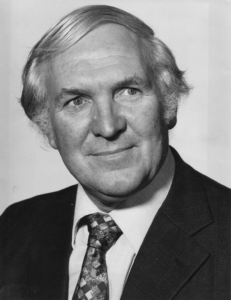Sir James Black

Sir James Whyte Black was a Scottish pharmacologist, and the only graduate from the University of St Andrews that holds a Nobel prize. He was born on the 14th of June 1924 and died on the 22nd of March 2010. His exceptional research on pharmacy led him to develop 2 very famous drugs for pain and disorder management in the human heart and stomach.
Born in Uddingston, Lanarkshire and brought up in Cowdenbeath, Fife, Black was the son of a large family. His parents, a mining engineer and a colliery manager had a deep love for music, which accompanied his early life. At school, except from those periods in his life through which he studied music or mathematics, he was mostly a daydreamer, until one of his high school teachers, Dr Waterson, guided him in following a career in Mathematics, and persuaded him to sit the exam for entering the University of St Andrews. Not only he was accepted, but he received the Patrick Hamilton residential scholarship for his studies. As someone who came from the Scottish countryside, university opened up his mind and, following the footsteps of his older brother, chose to study Medicine. Sir D’Arcy Wentworth Thompson became his mentor and pushed him to an academic career.
Black earned his degree in 1946, and a few years later, in 1950 he founded a physiology department at the University of Glasgow Veterinary School. He continued to teach in other universities until 1958, when he joined the Imperial Chemical Industries, working as a senior pharmacologist. After that, he continued his brilliant career both in academia and in industry, being head of biological research at Smith Kline & French Laboratories, director of therapeutic research at the Wellcome Research Laboratories and professor of Analytical Pharmacology at University College London and King’s College London, where he became emeritus in 1993. He became a fellow of the Royal Society in 1976 and he was knighted in 1981. Last significant step of his career is he being appointed as Chancellor of the Dundee University from 1992 to 2006. In 2000, he also became a member of the Order of Merit.
Research
Sir James Black won the Nobel Prize for introducing the drugs propranolol for the hearth and cimetidine for the stomach. It all began when he was examining the relations between cell receptors in the body and chemicals in the bloodstream. He was trying to find a drug to cure angina pectoris, which is pain caused by shortage of oxygen in the heart. He knew that beta receptors in the heart, when stimulated by the hormones epinephrine and norepinephrine, cause the heart to demand more oxygen, so he developed a drug that could block those receptors, therefore oxygen demand was less, and therefore pain was less. He used the exact same idea to create cimetidine, which is helpful for solving stomach problems.
To honour him, the University of Dundee has built the Sir James Black centre, a medical research centre examining cancer, diabetes, and tropical diseases. There is also the James Black Centre of King’s College London, where research in haematology, neurobiology and transplantation takes place, and also the Sir James Black Building of the University of Glasgow.
